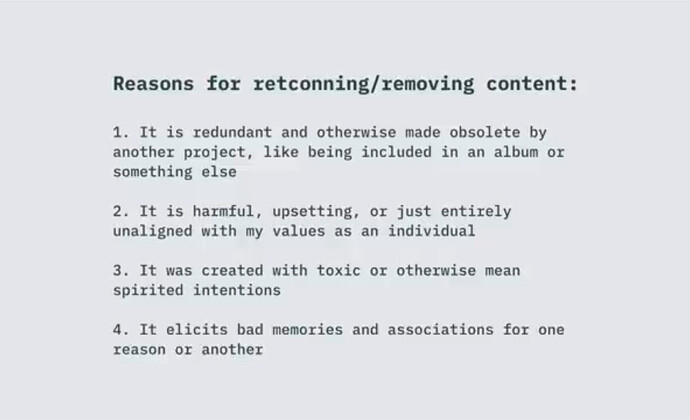After having the Withdrawn status for a while, it has become clear that there’s two reasonably different kinds of things people want to represent with it.
There’s releases (especially but not only digital) that the artist or label just took down, often to replace them with a new version with different cover art, a new artist name, an extra track / one less track, fixed mastering, etc.
There’s also releases (often entire release groups really) that the artist or label has grown to despise for whatever reason, does not consider part of their discography at all anymore and wants to expunge entirely from their release list.
The current Withdrawn status covers all of the second type of releases, and (depending on interpretation) some but not all of the first type. This has led to interesting issues, such as conflicting requests to show and not show Withdrawn releases as part of an artist’s official discography (which makes sense for the first type, but not for the second).
After some discussion in chat, I’m fairly convinced of the usefulness of just splitting Withdrawn into two. The easiest way to do this is probably (as suggested in STYLE-2555) to reword the current Withdrawn to be a bit more inclusive and cover the first type of releases entirely, and add a second Expunged type that covers the much more rare and much stronger second type of release. Expunged releases would need to be moved to the new type by hand but since they’re relatively rare, this probably would not be a huge problem.
The potential definitions:
Withdrawn
An official release that was actively withdrawn from circulation by the artist and/or their record company after being released, whether to replace it with a new version with some changes or to just retire it altogether (because of legal issues, for example). This does not include releases that have reached the end of their “natural” lifecycle, such as being sold out and out of print.
Expunged
A previously official release that was actively expunged from an artist or records company’s discography. This should be used only for cases where the release wasn’t just withdrawn, but the artist or label did not want to be associated with the release in any way anymore.
And the potential style page explanations and examples:
Withdrawn
Withdrawn is to be used for official releases that were actively withdrawn from circulation, be it because the artist or label replaced it with an updated version (with new cover art, a different artist name, a fixed tracklist, etc.) or because it had to be retired (often because of legal issues). Do not use this for releases that were not actively withdrawn, such as an album that was sold out, a store exclusive which stopped being available after the store closed, or a timed release which stopped being sold after the originally intended selling time ran out. Similarly, don’t use this for digital releases which were removed from a specific platform but are still available on others; in that case, just set an end date or “Ended” on the appropriate URL relationship.Use the initial release date, before they were withdrawn, for these releases. For any updated versions, use the date of the update, if known, or leave the date blank.
Examples:
- The original pressing of 逆転裁判+逆転裁判2 オリジナル・サウンドトラック was recalled due to a mastering error.
- U2 by Negativland was withdrawn due to a trademark infringement lawsuit.
- Sony BMG recalled all CDs with the ‘XCP’ copyright protection software, after pressure from consumer advocacy groups.
- After an artist name change, rapper Anike (formerly Wande) re-released her album Exit under the new name with new cover art.
Expunged
Expunged is to be used for previously official releases that were expunged from an artist or records company’s discography. This is not for releases that just were withdrawn from circulation (for that, use Withdrawn). It should only be used for releases where there is known artist (or label) intent to disown the release and no longer consider it part of their discography.Use the initial release date, before they were expunged, for these releases.
Examples:
- An attempt was made to cancel Play Date (100 gecs remix), but it was available briefly in at least one time zone before being removed.
- MORE EXPUNGED EXAMPLES GO HERE, PLEASE HELP PROVIDE SOME
Any reasons why this seems like a terrible idea? Any small adjustments that seem needed? Any good examples of expunged releases?
